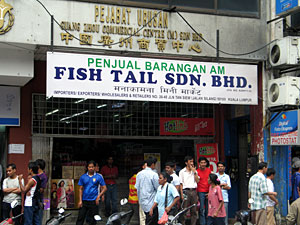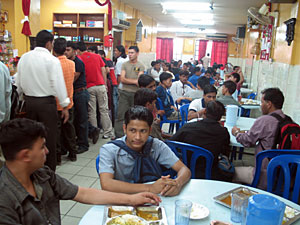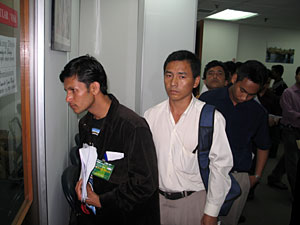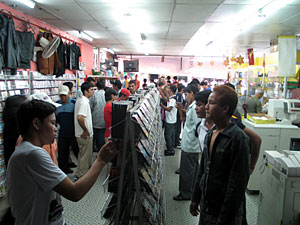 They have fled poverty and joblessness at home in Nepal. Most have been cheated by Nepali recruiters and some have been exploited by their Malaysian employers.
They have fled poverty and joblessness at home in Nepal. Most have been cheated by Nepali recruiters and some have been exploited by their Malaysian employers.
Government ministers describe them as modern Nepali 'heroes': migrant workers whose remittances sent home prop up Nepal's tottering economy. But they are not treated as heroes by some rapacious agents and immigration and customs officials at the airport.
At the royal Nepali Embassy in Kuala Lumpur on the 16th floor of an office building on Jalan Ampang in the city centre, it's just another day for Debilal Kandel, officer at the embassy, tries to calm dozens of agitated Nepali workers not paid as per contract or who have been mistreated by employers.
"I feel their pain and it really depresses me to think how they were tricked into coming here," says Kandel as he tried to assist workers in the embassy's reception area last week. Some were raising their voices and they told two visiting journalists from Nepal that the embassy was no help at all. "I'm so fed up, I just want to go home," one of them told us.
The workers have good reason to be angry. Most of them were deceived by their recruiters in Kathmandu, who had promised hundreds of dollars a month in salary, benefits and easy work. After they arrived in Malaysia they earned less than half the amount stated in their contracts. Most are working in Chinese plastic, food and chemical factories for just Rs 5,000-7,000 a month-after paying hundreds of thousands of rupees to agents back home.  "When we asked the companies to pay as per our contracts, they just threatened to hit and kill us," says Dipendra Timilsina, who arrived here two months ago. Timilsina and 18 other fellow Nepali workers organised a strike at Perak Duck Food Industry on 14 November. The strike spread to two other companies, Kelan Behun Bersatu in Kedah and Hip Hong Plastic Company at Muar Johar. According to the workers, employers paid Vietnamese and Bangladeshi migrant workers to control the Nepali strikers. "We were caned and beaten up severely so we ran away-we can't go back," says 23-year-old Sundar Kumar Yadab of Dhanusa. Yadab and 23 other Nepalis escaped into the jungle to hide from their attackers. Then they travelled six hours to Kuala Lumpur to seek help from the embassy. But it looks like they came in vain. There isn't much the embassy can do.
"When we asked the companies to pay as per our contracts, they just threatened to hit and kill us," says Dipendra Timilsina, who arrived here two months ago. Timilsina and 18 other fellow Nepali workers organised a strike at Perak Duck Food Industry on 14 November. The strike spread to two other companies, Kelan Behun Bersatu in Kedah and Hip Hong Plastic Company at Muar Johar. According to the workers, employers paid Vietnamese and Bangladeshi migrant workers to control the Nepali strikers. "We were caned and beaten up severely so we ran away-we can't go back," says 23-year-old Sundar Kumar Yadab of Dhanusa. Yadab and 23 other Nepalis escaped into the jungle to hide from their attackers. Then they travelled six hours to Kuala Lumpur to seek help from the embassy. But it looks like they came in vain. There isn't much the embassy can do.
Most of the workers have no choice but to rejoin their work. To date, some 13 have returned but 11 others have disappeared. Yadab says he is worried about them and about himself because he thinks his employer regards him as the ringleader of the group. Some workers at the embassy tried desperately to contact their recruiters in Kathmandu but in vain. They had all provided fake names and telephone numbers.
The plight of Nepali workers abroad is not new and many recruiters and employers in Malaysia continue to get away with exploitation because the workers have nowhere to turn. Malaysia is drafting a new law that will protect migrant workers from cruel employers and guarantee a minimum wage. The secretary-general of Malaysia's Ministry of Human Resources is visiting Kathmandu this week and it's believed he will be discussing the new law as well as recent incidents concerning Nepali workers in his country.
Ironically, it seems the Malaysian government is more concerned about the welfare of Nepali workers than the Nepali government. 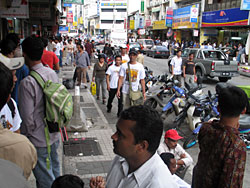 Malaysia's The Star newspaper is working on an investigative report on Nepalis being underpaid, exploited and their passports held up by their employers after the celebrated case of Mangal Bahadur Gurung. The former porter was caned and spent 51 days in a Malaysian jail when he was mistakenly arrested as an illegal worker. He was released and his conviction set aside in May.
Malaysia's The Star newspaper is working on an investigative report on Nepalis being underpaid, exploited and their passports held up by their employers after the celebrated case of Mangal Bahadur Gurung. The former porter was caned and spent 51 days in a Malaysian jail when he was mistakenly arrested as an illegal worker. He was released and his conviction set aside in May.
Members of Nepal's National Human Rights Commission have visited Malaysia twice but workers here say they didn't even bother to visit their colleagues detained in jails here. "They came, partied, shopped and left without any interviews," says labour activist and journalist Ramesh Poudel who runs the Nepal Labour Organisation here and publishes a Nepali-language weekly called Shram Saptahik, which has a circulation of 7,000.
Nepali workers here are now worried that publicity about the strikes and exploitation could jeopardise the future job situation. An estimated 200,000 Nepalis now work in Malaysia, the highest number after India and the Gulf.
"We're thankful that the Malaysian government has opened doors for us but the weakness of our own government and exploitation by Nepali manpower agents are ruining this opportunity," says Niraj Sapkota, who runs Nepal House, a restaurant and lodge where hundreds of Nepalis congregate every day to share problems.
Nepal still has no labour agreement with Malaysia through which Nepalis can have more rights as overseas workers. The Nepali embassy here has tried hard to convince the Foreign Ministry in Kathmandu to send more staff for the embassy and for the Labour Ministry to take action against blacklisted recruiters in Nepal. But not much has been done. 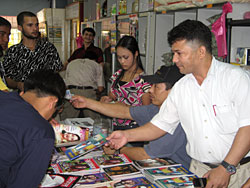 Despite the workers' hardships, Nepalis are still desperate to work here. Every morning hundreds of people throng the gates of the Malaysian Embassy in Harihar Bhawan for their visas and the airport is crammed with workers waiting for flights. Dozens of workers landed in Kuala Lumpur on a midnight flight last week but there was no one there to fetch them. With no money and completely lost, they wandered aimlessly in the arrival area, hungry, thirsty and culture shocked.
Despite the workers' hardships, Nepalis are still desperate to work here. Every morning hundreds of people throng the gates of the Malaysian Embassy in Harihar Bhawan for their visas and the airport is crammed with workers waiting for flights. Dozens of workers landed in Kuala Lumpur on a midnight flight last week but there was no one there to fetch them. With no money and completely lost, they wandered aimlessly in the arrival area, hungry, thirsty and culture shocked.
Not all Nepalis suffer, many especially those working in consumer electronic,plastic, furniture or computer factories, are interviewed and recruited by their employers in Kathmandu itself. But the horror stories are hard to ignore. "I don't know why they keep on coming. I strongly urge Nepalis not to apply for work here unless they go through good manpower agents," says Nabin KC, who has been working here for the last five years. The last two years he has been illegal and has even been jailed but he is taking the risk to prolong his stay as he now has a good job that pays Rs 20,000 a month.
Ashok Kumar Shah is going back to his home village in Morang in January. The New Global manpower agency in Kalanki sent him here promising a good salary but after three years he has only saved about Rs 10,000 because he was paid less than his contract guaranteed.
"I don't know how I'm going to explain this to my father who works so hard in the farm but at least I'll be with my wife and children again," he told us. When we tried to contact New Global Manpower in Kalanki it no longer existed.
Clueless in KL 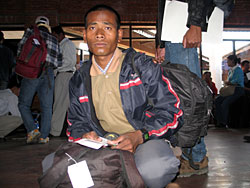
Daya Ram Chaudhary has just entered the departure area at Kathmandu airport when his small backpack breaks open. He ties it up with a piece of rope so the biscuits, toothbrush, a T-shirt and trousers won't fall out. This is all he is taking with him to Malaysia, where he will work for the next three years.
"I'm nervous," admits 26-year-old Daya Ram. "I've never been abroad." He has just Rs 500 in his pocket and a one-way ticket on Air Nepal. He doesn't know who will come to fetch him at Kuala Lumpur airport and doesn't even know the name of the company where he'll work or the kind of job he is going to do.
All that his recruiter told him was that he was going to Malaysia. He paid his agent Rs 100,000 after borrowing money from a village moneylender in Kanchanpur at an interest rate of three percent. "They didn't tell me anything," he says but brightens up as he adds, "I hope to return with lot of money."
Daya Ram has heard of Nepalis like him being duped by their agents, not being paid as much as promised and having to do back-breaking work. "I'll just have to take that risk," he says as his flight is announced.
Striking it rich
Subash Shrestha from Jhapa is a typical Newari trader. Three years ago, when he came to Malaysia to work as a security guard, he saw that most Nepalis were working in small restaurants and hotels. He made a plan with his brother to start a mini-market stocking the kind of things Nepalis here need: Nepali magazines and newspapers, books, Nepali folk music in CDs, novels, pens, clothes. His Fishtail Shop was a hit. On Sundays, Shrestha serves up to 10,000 Nepali customers. He is now making Rs 200,000 a month but has not left his night security guard job as it pays well.
WEB EXCLUSIVE | PHOTO GALLERY
ALL PICS NARESH NEWAR

